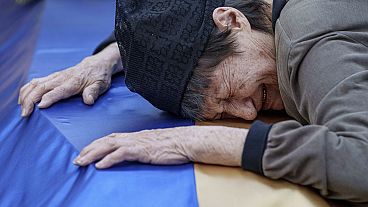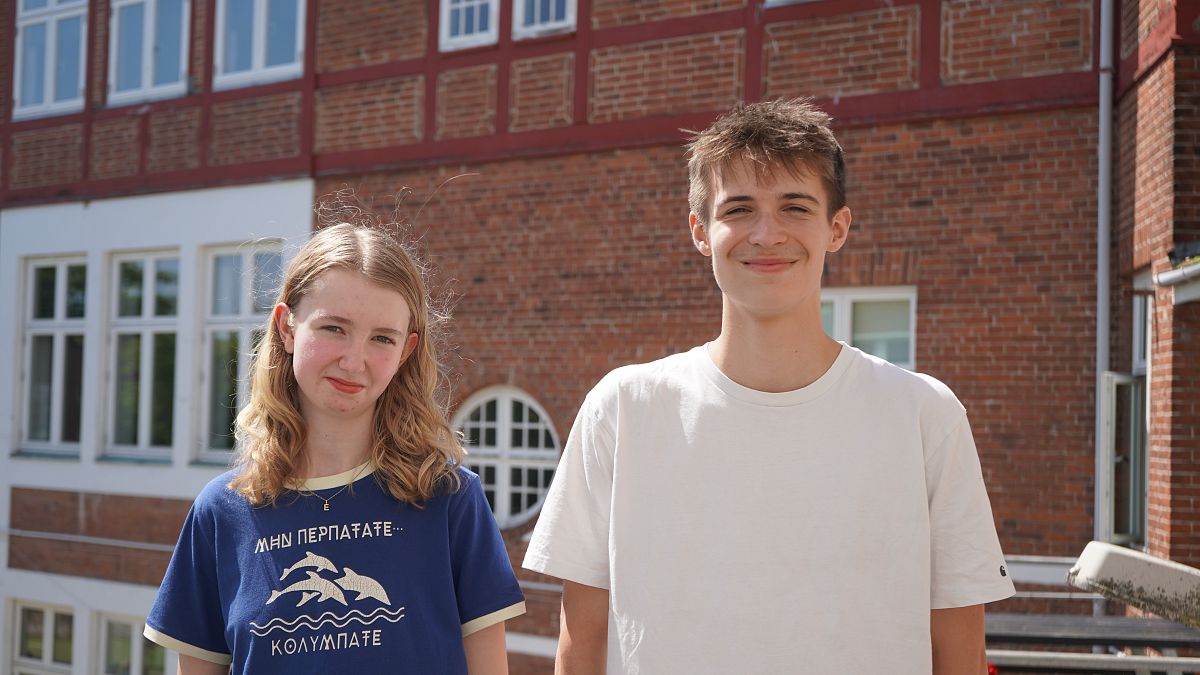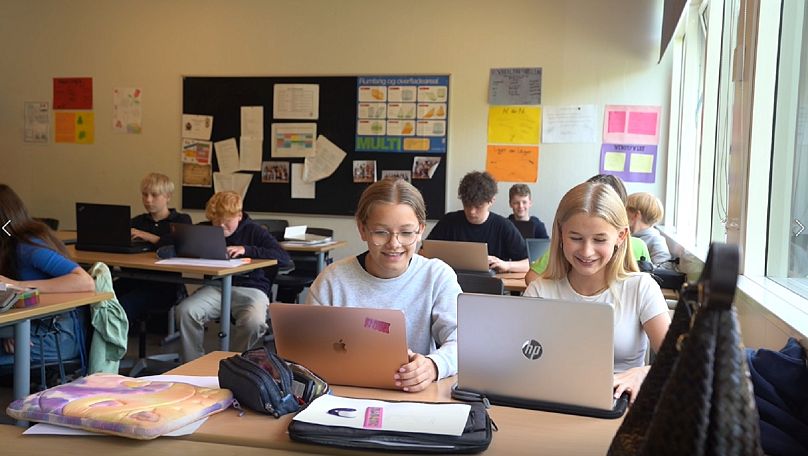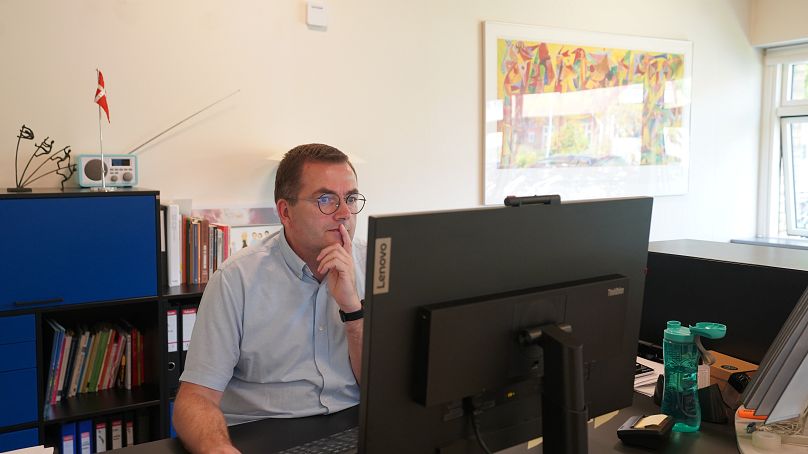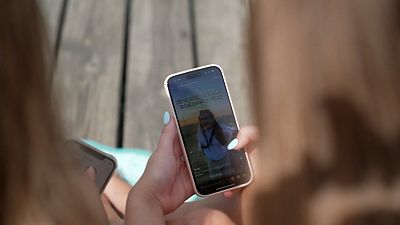Amid a growing awareness of youth mental health, some 20 schools in Denmark have pushed back their start times following a two-year trial.
Remember the struggle of staying awake in those early morning classes at school?
For 15-year-old Danish student Rasmus, it was hard to fall asleep at night and he often went to school without having had enough sleep.
"You lie and turn and turn for a long time, maybe an hour or two, and cannot fall asleep," he told Euronews Health.
Public health and sleep experts in Denmark say young adolescents have a different circadian rhythm than adults, and that teenagers in the Nordic country don't get enough sleep.
According to a report from the National Institute of Public Health, a research foundation in Copenhagen, teenagers should sleep eight to 10 hours a day but almost 60 per cent of 15-year-olds today sleep less than that.
The report contends that this is due to both bodily changes and the use of screens in the evening.
Research suggests that melatonin, a hormone that the human body releases at night to induce sleep, and cortisol, a stress hormone that wakes up our body respectively, are released later in the day in teenagers than in adults.
"If you ask a teenage daughter at 10 pm to go to bed and she says 'I'm not sleepy yet,' then she [may] not be lying. So the physiological needs of teenagers do not fit with how the school system is structured, demanding them to go to school early," Cathrine Wimmelmann, a senior researcher at the Centre for Childhood Health, told Euronews Health.
The consequence of too little sleep can lead to an increased risk of unhappiness, difficulty concentrating, and the development of stress and depression.
Amid a growing awareness of youth mental health, several schools in Denmark have trialled changing their start times since the summer of 2023.
In 2022, Rasmus’s school, Th. Langs Skole in Silkeborg, western Denmark, began letting pupils aged 13 to 16 (between Danish 7th and 9th grades) start at 9 am instead of 8.10 am.
"You get better quality sleep and you fall asleep faster," Rasmus said.
The experience is not limited to Rasmus.
"Before, we were very tired and quite upset in the morning. There were a lot of us feeling drowsy and we didn't really care for each other," Emily, a 15-year-old student (9th grade) at Th. Langs Skole, said.
"But afterwards, when we started gathering at 9.00, we became happier and happier. We talk to each other instead of looking down at our phones," she added.
Positive results
"They sleep better, they sleep longer and they actually have more energy. Not only in the morning but also during the day and when they have to do their activities outside of school," Tine Agerholm Kristiansen, the school principal at Th. Langs Skole, told Euronews Health.
Th. Langs Skole collaborated with a Danish tech start-up, Enversion, to track the sleep of students between the 7th and 9th grades via an app.
Based on the app-based surveys, the school found that students slept an average of 7 hours and 58 minutes during the tracking period and showed improvement in sleep duration, sleep efficiency, and fatigue during the first three months of the initiative.
"Their sleep efficiency, that is, how much time they spend in bed actually sleeping. Over a wide crest, it had risen a lot," Karina Juul Uldal Christesen, a communication officer at Th. Langs Skole, said.
"Our then-seventh-grade class used to spend an average of 3.5 hours falling asleep before the project. It's way too much. It fell to 1.6. Our eighth class used to spend 2.5 hours, which fell to 0.4 hours. Our ninth-grade class dropped to about half an hour," Christesen added.
The story of Th. Langs Skole has spread throughout the country and inspired other schools over the past two years.
Today, there are about 20 schools in Denmark that have pushed back their start times.
Taastrup Realskole, located 20 km west of Copenhagen, was one of the latest ones to follow suit when the current school year started.
"From this year, we have started with the senior students [who] are meeting one hour and 15 minutes later than all the other students because of their sleeping habits," said Kennet Hallgren, Taastrup Realskole’s School principal.
Students here have had similar positive experiences.
"I'm very satisfied because I go to bed at the same time. So I get basically one hour more sleep so I can be more productive in school and I'm more focused," said Julius, a 13-year-old (7th-grade) student at Taastrup Realskole.
"I really liked the new school start time. Because you can sleep in longer, and I'm now more concentrated in school and I can learn more," said Lina, a 13-year-old (7th-grade) student at Taastrup Realskole.
Restructuring the school day
Experts say a later start time shouldn’t mean a later finish time to ensure students have enough free time after school.
"The big question is how to implement it. The easiest way is to just prolong the day; Meeting later, going home later. I don't think that's the way to do it, because that would compromise the students and spare time activities," Wimmelmann said.
"We need to think creatively in terms of how to structure the school day,” she added.
Under Danish law, nothing prevents schools beginning later so long as the target hours are met.
"There is only an actual legal requirement that the teaching must take place between approximately 8 am and 4 pm unless there are special events," according to Denmark’s Ministry of Education.
"It is up to the schools and the municipalities to decide how the teaching is to be organised, and the municipalities decide how many and how long school days pupils should have. The municipalities can thus, for example, choose to operate with more school days than usual, whereby the days can each be slightly shorter".
Private schools like Th. Langs Skole and Taastrup Realskole have more regulatory freedom and resources to restructure their curricula to implement a later school time.
"We haven't changed the lesson length, but… we have put two teachers in some of the lessons," Anja Nordgaard Roland, the Vice-Principal of Taastrup Realskole, told Euronews Health.
Some public schools have also managed to start later and end at similar times as before by adjusting school curricula.
Long-term effects unclear
While experts believe it’s a promising initiative given the physiology of teenagers they warn there are a few caveats.
"In Denmark, many of the schools that have implemented the initiative have not had methodologically scientific evaluations of the initiatives," Wimmelmann said.
"Many of the studies that evaluate these initiatives only address sleep duration and that is only half of the story," Wimmelmann added.
"We mostly look at sleep duration and not the quality of sleep [in these studies], and they're both really important for the outcomes; cognitive ability, social abilities, and stuff like that".
Previously, schools in the US, Israel, and Singapore have tried similar experiments and yielded positive results.
Wimmelmann says it’s unclear whether the effects will last for a longer period.
"The very positive results from some of these studies are a few years old. I think they cannot necessarily be transferred and used today because a lot happened to young people's lives," Wimmelmann added.
Experts say moving a school's starting time alone is not sufficient and addressing other health behaviours such as the screen or physical activity could help improve or support the effects of the initiative with later school start times.
"Screen use definitely affects sleep quality; the waves, how deep we go in our sleep, and the continuity of sleep. We wake up more if we have been looking at a screen until we fall asleep," said Wimmelmann.
The schools that have pushed their start times admit that mitigating students’ screen time is a challenge but important to ensure better sleep and improve the well-being of their pupils.
Islev Skole, located in a Copenhagen suburb, is a public school that has delayed its starting time and run a campaign named 'Healthy Sleep and Healthy Screen'.
According to its recently published evaluation report, the school actively communicated "key tips" for healthy screen use with its pupils as well as tracked their sleep and screen time using technologies.
As a result, screen time in bed and fatigue decreased, and sleep duration and efficiency increased in all 7th classes that participated in app courses and tracking for four weeks.
Mental health crisis
Wimmelmann says the number of teenagers who don't sleep enough has doubled since the 1980s.
"We have known and discussed this for years. But I think why it is happening now ... it's due to this massive, focus on mental well-being among our youth," said Wimmelmann.
"We are talking about a mental health crisis at the moment. Society and the research environments are all very preoccupied with finding solutions to how we can improve the living conditions for our young people. And this is one, obvious way to adjust the system to their needs," she added.
Just Human is a Danish NGO that works "to inspire schools and lawmakers to consider implementing later school start times".
It launched the project ‘Later Meeting Time’ five years ago when most schools were reluctant to embrace the idea.
"Structural changes are needed to improve the well-being of children and young people and to turn around this mental-health crisis," Eva Molin, the ‘Later Meeting Time’ project manager at Just Human, told Euronews Health.
"By letting the teenagers start school later in the morning, we can give them the opportunity to sleep more and this can have a great positive effect on their well-being, health, learning potential and social interactions. There are so many great benefits," she added.
"We are very happy to see now that the schools are opening up for this idea and that they realise the benefits that the later start times could give the students".
About seven municipalities in Denmark are currently engaged in active discussions about support for schools to try a later start time, according to Just Human.
"They're opening up and trying to investigate – 'how can we do it in our municipality?,' 'What can we do this to support young people's sleep and therefore overall mental health and well-being?'" said Molin.
For more on this story, watch the video in the media player above.

